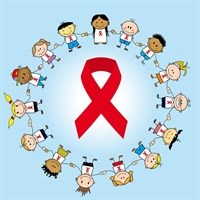Starting HIV-positive babies on antiretroviral treatment (ART) within days of birth is proving to be beneficial to their health in more ways than expected. Researchers at Stellenbosch University (SU) are conducting a study to explore the advantages of this treatment regime that may pave the way for HIV-cure research in the future.
In August 2013, the team of SU researchers began a study to test the effects of very early treatment in the local setting. Working at two sites in the Western Cape, they test babies newly born to HIV-positive mothers and, if found to be HIV positive, start them on treatment by day three of life. The study has since been expanded to include the use of 'point-of-care' instruments that allow tests to be done in the clinic, instead of having to be sent to centralised laboratories for testing as is the practice currently.
"We believe our study is important to establish the full extent of benefit conferred by early diagnosis and treatment programmes in infected infants," says lead researcher of the early diagnosis study, Dr Jean Maritz with the Division of Medical Virology at SU's Faculty of Medicine and Health Sciences (FMHS). The aim of the study is to evaluate the clinical and immunological status of babies that start treatment very early and compare it to babies starting treatment at seven to eight weeks of age (which is standard practice in most health care settings in South Africa), as well as to evaluate the impact of new approaches such as clinic-based diagnostic devices.
In recent years, the time of ART initiation has progressively moved forward as more evidence of the benefits of early treatment came to light. A new development came in 2013 when the so-called Mississippi Baby (named after the American state where she was born) seemed to be cured of HIV after she was diagnosed at birth and started on ART at just 30 hours of life. However, earlier this year HIV was again found in the child's blood, suggesting that she was never truly cured and that the virus had always been present, albeit at undetectable levels.
The case of the Mississippi Baby did show that very early treatment (started within days of birth) might drastically reduce the size of the viral reservoir, compared to starting treatment only after six weeks of age, the current standard of care. This was evident from the fact that the baby had no evidence of HIV infection for more than two years after therapy was inadvertently interrupted.
"Babies that receive early treatment have less virus and may later be good candidates for future cure studies," says one of the co-researchers, Dr Gert van Zyl, also with the Division of Medical Virology.
Extends to adult treatment
Studies in adults (Visconti trial) have shown that patients who receive early treatment often have such low viral loads following therapy interruption that they can go without treatment for periods. "So another potential benefit is that the overall amount of treatment patients have to take during their lifetime may be reduced," says Van Zyl, whose own research focuses on drug resistance to ART.
Van Zyl explains that HIV causes irreparable damage to the immune system very early into infection; this never normalises, even after years of treatment. It is thought that early treatment will protect the immune system from this damage and result in HIV-positive patients having similar immunity to uninfected people.
"Early treatment has several short-term advantages, but there are also potential benefits over the long term that we never even anticipated," says Van Zyl. "This isn't just a study, or an interesting question we are trying to answer, it could change the lives of these babies."
Babies diagnosed and treated early will also be recruited in a study examining the size of the viral reservoir compared to babies started on therapy later. This study, led by Professor Mark Cotton, is funded by the NIH and includes patients from the children with early antiretroviral therapy (CHER) cohort as well as children recruited through Dr Maritz's study.
The head of the Division of Medical Virology, Prof Wolfgang Preiser, agrees that the research might have advantages for HIV-patients beyond the cure agenda. "Regardless of whether it is successful in curing infection, we already know that we are doing something good for these children by identifying and treating them early. It also allows us to improve our diagnostic testing and to find the optimal time points for diagnosing exposed young children," says Preiser.
The results of this study, which will follow babies for at least a year, are expected to be available by 2016.

















































